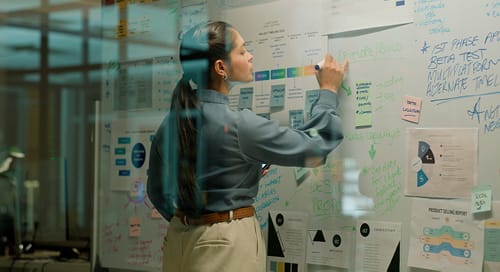Leadership Development Research & Insights
EXPLORE VALUABLE ARTICLES, VIDEOS, AND TOOLS TO ADDRESS YOUR LEADERSHIP AND MANAGEMENT CHALLENGES
-
 0:56Watch Video
0:56Watch VideoLatest Leadership Resources
Get our newest webinars, podcasts, and research delivered to your inbox.
-
 Read Publication
Read PublicationHow to Build a Business Case for Coaching
Align leadership development with strategy and prove ROI to secure stakeholder buy-in.
-
How We Empower Government Leaders
Learn More -
 Read Publication
Read PublicationThe Talent Retention Playbook: Leadership Strategies for Government Agencies
How to address burnout, boost engagement, and retain top talent in public service.
-
 Read Publication
Read Publication2025 HR/L&D Trends Survey: Evolving in a Rapidly Changing Environment
This year’s survey identifies the ways organizations are being called upon to develop leaders who can inspire, adapt, and thrive amid disruption.
-
 Read Publication
Read PublicationDesigning Effective Learning Journeys: 3 Strategies for Real Change
Catalyze individual growth and organizational success
-
Read Publication
A New Perspective: The Factors That Encourage and That Discourage Innovation in Organizations
Researchers at Blanchard posed questions about innovation to executives, managers, and individual contributors.
-
Read Publication
Creating Impact Reports that Senior Leaders Love
One big challenge that makes most L & D professionals nervous is having to show the impact of training in a way that makes sense to senior executives in your company.
-
Blanchard Community: where leaders come to grow
Join Today -
Read Publication
The Five Drivers of Learning Impact
Training won’t make a difference if learners don’t apply their newly acquired knowledge and skills.
-
Read Publication
Exploring The Heart of Human Achievement: Six Simple Truths
Learn the six enduring leadership principles that will help aspiring leaders become more effective and respected along their journey.
-
Read Publication
Amping Up the Value and Return of Your Learning Investment
A Process for Closing the Learning–Doing Gap and Providing Measurable Results
-
Read Publication
An Unvarnished Look at Asking Employees to Return to the Office: A Blanchard Point of View
A look at the issue in detail and Blanchard's perspective on successfully navigating the challenge.
-
Read Publication
Six Ways to Supercharge Your Next One-on-One with Your Boss
Learn six ways you can supercharge your time with your leader
-
Read Publication
Blanchard’s Point of View on Diversity, Equity, and Inclusion
Diversity, Equity, and Inclusion: Making progress on one of today’s greatest challenges
-
Are you a servant leader and don't know it?
Take Quiz -
Read Publication
SLII. Why a Situational Approach to Leadership Makes All the Difference
This study investigates the effectiveness of the four leadership styles of the SLII model, which evolved from initiating structure and consideration.
-
Read Publication
Leading Successful Change Initiatives
Why We Need a High-Involvement, Collaborative Approach to Making Change Initiatives Work in Business
-
Read Publication
Are You a Directive or Supportive Leader?
Forty years of Blanchard research has proven that the best leadership style is the one that matches the developmental needs of the person you’re working with.
-
Read Publication
Building Resilience in Times of Crisis
As we all adjust to a changing landscape and a new normal in our personal and professional lives, it is imperative that we each develop an increased capacity to thrive in the face of adversity.
-
Read Publication
Servant Leadership: A New Approach to Creating a Culture of Success
In this collection of articles, we explore the concepts and paradigm shifts organizations must consider to embrace servant leadership.
-
Read Publication
High Performance Teams: What It Takes to Make Them Work
Explore how properly functioning and thriving teams can improve creativity and productivity.
-
Read Publication
From Engagement to Employee Work Passion
Maximizing the productivity and profitability of organizational workforces continues to be a key focus for organizations.
-
Loading More...



